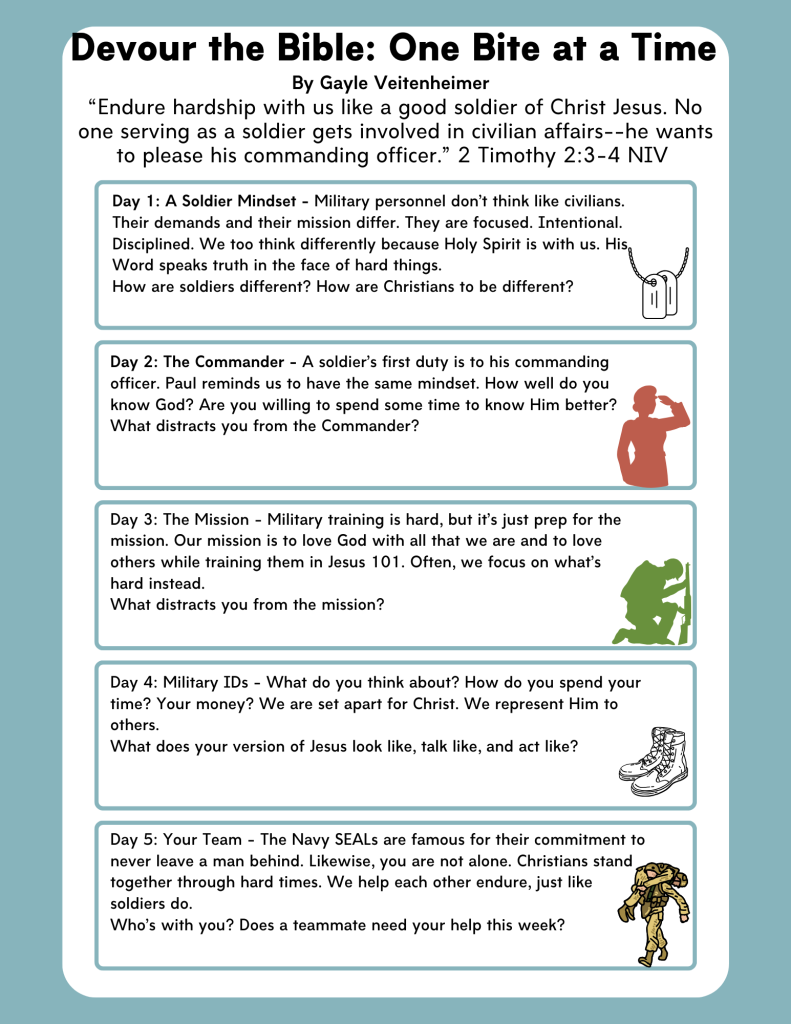How to Endure Hardship Like a Soldier—Spiritually

“Endure hardship with us like a good soldier of Christ Jesus. No one serving as a soldier gets involved in civilian affairs—he wants to please his commanding officer.” 2 Timothy 2:3-4 NIV
Three days after graduating from college, our oldest left for the Navy’s boot camp in Great Lakes, Illinois.
When we saw him eight weeks later, we hardly recognized him.
He had changed. His clothes. His hair. And his behavior. During his few hours of leave, he glanced at his watch every five minutes. He could not be late to the base. Before leaving us, he checked his cover (hat) and his uniform making sure all was as it should be.
We watched, mouths open.
No longer a civilian, he had a new focus (making the SEALs) and a new commander (Big Navy). And when they said, “Jump,” he jumped. Those early weeks of boot camp prepared him for the following year of SEAL training where the hardships endured sent many to the bell to ring out and take a different job with the Navy. Our son endured and earned his Trident.
Many things about military service have remained constant with time. In 2 Timothy 2:3-4, Paul called Timothy to the same degree of intentionality and commitment Paul saw in the Roman soldiers around him.
He calls us, too.
Because, like my oldest, we volunteered for this gig.
Here are some tips for enduring hardships like a soldier:
Remember the Commander (Matt. 22:37-38): One of the first things taught in boot camp are rankings, officer and enlisted. Paul spoke of a soldier’s desire to please his commanding officer. While we believers serve under many authority figures, we are ultimately accountable to One. Paul encouraged his readers to make it a priority to find out what pleased Him—and to do it. Worship Him. Get to know your Commander. Spend time together. Talk. Listen. His door is always open.
Remember the Mission (Matt. 22:39; Matt. 28:19-20): Our oldest endured the most difficult training the U.S. military has to offer. The training, however, was nothing but prep for the mission:
To support and defend the Constitution of the United States against all enemies, foreign and domestic; to bear true faith and allegiance to the same; and to obey the orders of the President of the United States and the orders of the officers appointed over him, according to regulations and the Uniform Code of Military Justice.
Our mission? To love God with all that we are and to love others while making disciples of all nations, baptizing them in the name of the Father, Son, and Holy Spirit. And in Paul’s time, people died for this mission too.
Often, we focus on the hardships. Yet the hardships point to greater things. To draw us nearer to our God. To hook the other end of the yoke to Jesus and learn from Him. And to help others in turn. When the hardship (finances, illnesses, loss) looms large, don’t lose sight of the mission (relationships).
Remember Your Identity (Eph. 5:8-11): What dominates your thoughts? Your time? Your motives? Your spending habits? Military personnel don’t think like civilians. Their mindset differs because their demands and their mission differ. They are focused. Intentional. And we admire their discipline.
The secular world should admire ours. Our integrity. Our kindness. Our self-control.
Remember Your Fellow Servicemen and Women (Eph. 4:15-16): You are not alone. Commitment flourishes in community. Enduring hardship comes more easily when someone stands with you. The body of believers stands ready to offer support and encouragement.
We’re to be different—in a good way. Put civilian thoughts aside. Remember the Master and the mission, who you are, and who has your back. Hooyah!
Q & A:
If a friend or family member has military experience, ask them to speak to the differences between civilians and servicemen and women.
What distracts you from the Commander? The mission?
How would secular friends and family describe you? Do they see a difference or are you just like them?
How can you as a family remember who you are? What does service to God and to others look like? Do you have a family mission statement? If not, craft one this week.
Do you engage with the body of believers? What does that look like? What’s it like when community is missing?
Download free 2 Timothy 2:3-4 resources for elementary and preschoolers: Devour the Bible. Here’s page 1 of the elementary version:

Join Gayle
Subscribe to get my latest content by email.
We respect your privacy. Unsubscribe at any time.

